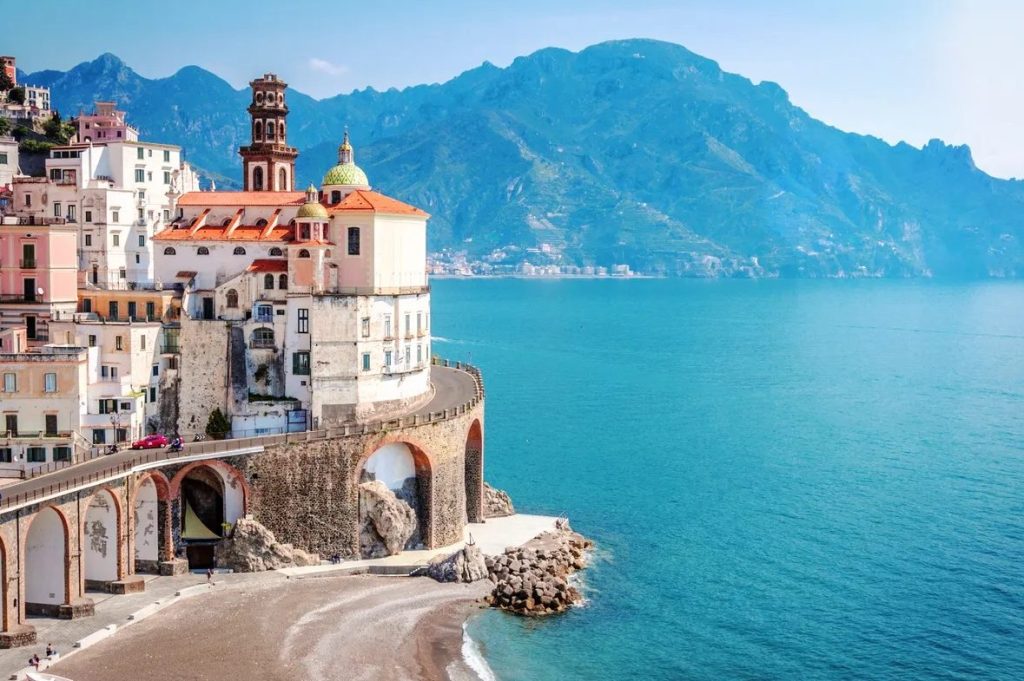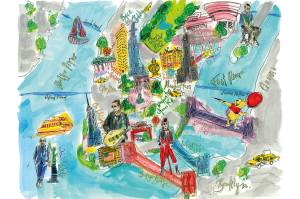Some time in the Noughties I sat next to a guy at work who told me he’d just had a vacation in a village on the outskirts of Amalfi. The village was called Atrani — quite unknown then, but now swooned over as the setting for the ominous but dreamy black-and-white Netflix adaptation Ripley. That year, I had no plans for the summer and decided to replicate his trip, with my two daughters, aged thirteen and ten. There was no hotel in the village, rather a series of rooms rented out by a lawyer called Filippo. I contacted him to book and he replied: “I’m sure it will be fine, just turn up.” This didn’t over-fill me with confidence but I went ahead. We flew into in Naples late one evening and got to the hotel I’d found in the Rough Guide. Rough didn’t quite cover it — our room was tiny and windowless and breakfast was a malfunctioning vending machine in the lobby.
By the end of the week everyone recognized us and would wave and shout ‘ciao belle’ wherever we went
Ripley is set several years earlier but the bus he catches from Naples to Atrani is not vastly different from the one we took, and the hair-raising driving and views from the road exactly the same. We tracked Filippo down; he had no memory of who I was but showed us to a room with a corner balcony looking out onto the square — a balcony I have clearly spotted in Ripley. In this square, truly the whole of life took place: young men leaning against Vespas, children playing, shopkeepers lurking in doorways, old ladies watching everything from windows and balconies above. Filippo asked me for my passport and I realized with horror that I’d left it at the Naples hotel. Don’t worry, he said, I’ll get it back. Sure enough, a couple of days later he handed it to me, having got the hotel to give it to the bus driver from whom he picked it up at the bus stop.
Filippo’s brother was in charge of breakfast, served in one of the square’s cafés. My elder daughter refused to get up that early; he immediately clocked the difficult-teenager scenario and gave me a pastry wrapped in a paper napkin for her and a carton of juice.
So began a perfect week. Every day we walked through the now familiar arches to the beach, returning for lunch in the square, after which we walked into Amalfi for ice creams on the steps of the Duomo. Back for dinner in the square, followed by games of cards at a café table. I wanted to go to Pompeii but the girls refused. I gave in and have felt guilty ever since. We did take a boat trip to Capri, and one day walked up, up and up to another little village, past terraced lemon groves on which donkeys with basket panniers were being used to collect the large knobbly fruit. By the end of the week everyone recognized us and would wave and shout “ciao belle” wherever we went. The day we left, Filippo helped us carry our bags to the bus stop and presented me with a beautiful plate which hung on a wall in my garden for years.
Now I read that because of Ripley, the previously unknown Atrani is going to be swamped with tourists. Airbnb reports that bookings are up 92 percent on the year. The locals are dreading it and the village will not be able to cope. I had always wanted to go back but I guess it’s too late. Since then, I have married a man who part-owns a house in Umbria which we go to every year. I love it but it could never quite match that quintessentially Atrani experience of twenty-odd years ago.
This article was originally published on The Spectator’s UK website.





















